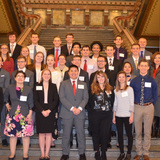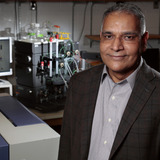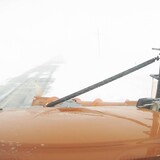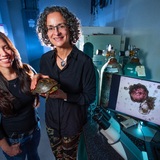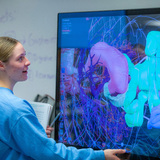News Archive
Friday, March 22 2024
-
Former Ohio Gov. John Kasich to discuss innovation during 23-24 Manatt-Phelps Lecture at Iowa State
Two-term former Ohio Gov. John Kasich will deliver the 2023-24 Manatt-Phelps Lecture in Political Science at Iowa State University on March 27. The Manatt-Phelps Lecture series, established in 2002, brings to campus a prominent practitioner or scholar to address issues of significance to the United States and Iowa.
-
2024 Innovation at Work: Designing vibrant communities
Through the Community Visioning Program, more than 250 Iowa towns have received research and design expertise to beautify downtowns, improve transportation and support outdoor recreation.
-
Iowa State University undergraduates to show off research at the Iowa Capitol
The 18th annual Research in the Capitol event, scheduled for 11 a.m. on Monday, March 25, will transform the Iowa Capitol Rotunda in Des Moines into a showcase for the academic achievements of undergraduates from the three Regents institutions. ISU students will present research posters detailing 20 projects spanning a diverse array of subjects, ranging from disease threats to apples and pears to the use of soybean-based polymers to improve asphalt.
-
New book sheds light on criminal behaviors and forensic frontier with DNA
With a new book, an Iowa State criminologist examines over 100 cold cases recently resolved by DNA evidence. The book highlights new forensic technologies, investigative techniques and policies that can bring justice to victims and legal closure to families, and sheds light on serial offender behaviors.
-
First-of-its-kind super minigene to boost spinal muscular atrophy research
An Iowa State University research team built a shortened form of the gene that causes a deadly childhood disease, which will make searching for potential treatments quicker and more effective. It’s the first-ever super minigene, a concept that could be used to make easier-to-study versions of genes linked to other illnesses.
-
Follow the little blue plow: Iowa State engineers help snowplow drivers stay on the road
The Iowa Department of Transportation is supporting Iowa State engineers as they work to develop, test and prove the concept of a snowplow navigation system. The system is designed to help snowplow drivers maintain their position in a lane. A second phase of the project will help snowplow drivers avoid collisions with snow-covered cars or debris in the roadway.
-
Lab-grown liver organoid to speed up turtle research, making useful traits easier to harness
A team of Iowa State University researchers developed protocols for growing organoids that mimic a turtle liver, the first organoids developed for a turtle and only the second for any reptile. The discovery will aid deeper study of turtle genetics, including the cause of traits with potential medical applications for humans such as the ability to survive weeks without oxygen.
-
Learn how eight influential ingredients shaped American cuisine during upcoming lecture
Author and culinary historian Sarah Lohman will discuss how food has shaped American history and culture during a lecture at Iowa State University on March 4. The lecture, titled “Eight Flavors: The Untold Story of American Cuisine,” will explore how American food is united by eight key flavors.
-
Advisory: US Department of Energy selects ISU-led project to build rural Iowa’s first ‘microgrid’
The U.S. Department of Energy is supporting an Iowa State-led project to build the first “microgrid” in rural Iowa. The project will create a utility-scale microgrid in Montezuma to provide reliable, resilient and affordable electricity. The new system will feature power generation from solar panels, a battery storage system and two chargers for electric vehicles.
-
Virtual dissection fleshes out instruction in animal science anatomy lab
Students in the foundational anatomy course in Iowa State University’s animal science department use virtual dissection to supplement their hands-on learning via more traditional methods, a technology that’s common in medical and nursing school but a rare opportunity for animal science students.


